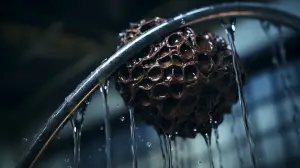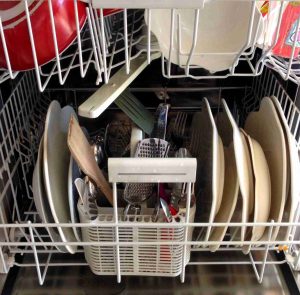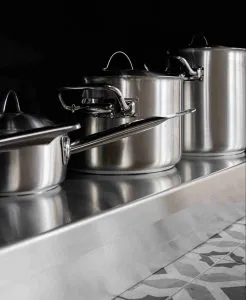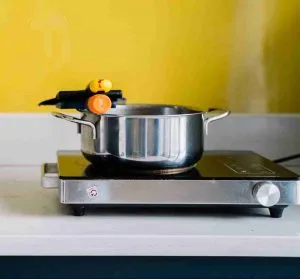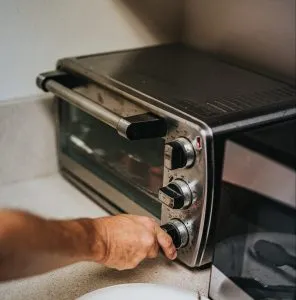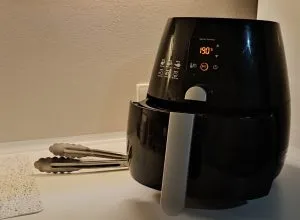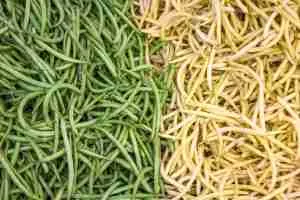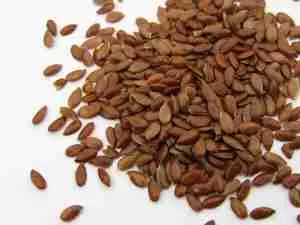Many people wonder if it is safe to put their beloved cast iron skillets and pans in the dishwasher, so let’s address this common kitchenware query. If you’re curious about which other pans can safely go in the oven, you can find out more here.
Contents
ToggleKey Takeaways:
- It is not recommended to put cast iron in the dishwasher as it can ruin the seasoning and cause rusting.
- The water jets and harsh detergents in the dishwasher can strip away the seasoning on cast iron cookware.
- Cast iron cookware can rust easily when exposed to moisture, and the dishwasher’s prolonged exposure to water can contribute to rusting.
- Cleaning cast iron should be done by hand using warm, soapy water and a gentle dishcloth.
- To maintain the seasoning on cast iron, a small amount of oil can be applied and excess oil should be removed.
- If cast iron becomes rusted or loses its seasoning, it can be restored through various methods, such as soaking in vinegar/water or using a baking soda/water paste.
- Re-seasoning cast iron involves applying a thin layer of oil or shortening and baking it in the oven.
The Right Way to Clean Cast Iron Pots and Pans

When it comes to cleaning cast iron, it’s important to follow the proper techniques to preserve its seasoning and avoid rusting. For a detailed guide on cleaning cast iron frying pans, check out this article. According to experts, putting cast iron in the dishwasher is a big no-no. The dishwasher’s water jets and harsh detergents can strip away the seasoning, which is crucial for the pan’s non-stick properties. Additionally, prolonged exposure to water can lead to rusting, as cast iron is prone to rust when exposed to moisture. Therefore, it’s best to wash cast iron by hand.
To clean cast iron, start by using warm, soapy water and a gentle dishcloth. Contrary to old-fashioned advice, it is safe to use soap on cast iron. Be sure to dry the pan thoroughly after cleaning to prevent any moisture from causing rust. To maintain the seasoning, a small amount of oil can be applied and excess oil can be removed with a paper towel. Heating the pan on low heat for a few minutes on the stovetop can also help eliminate any remaining moisture.
If by mistake, you put a cast iron skillet in the dishwasher and it becomes rusted or loses its seasoning, don’t worry. There are ways to fix it. Soak the pan in a mixture of vinegar and water, or create a paste with baking soda and water to loosen the rust. Use steel wool to scrub the pan if the seasoning has already been ruined by rusting. After removing the rust, rinse, wash, and dry the pan thoroughly before re-seasoning.
To re-season your cast iron, apply a thin layer of vegetable oil or shortening to the pan and place it in the oven at 350°F for one hour. You can repeat this process 2-3 times or more if needed. Re-seasoning helps restore the non-stick properties and protects the pan from rusting in the future.
By following these proper cleaning and care techniques, you can ensure that your cast iron cookware stays in excellent condition for years to come. Remember, hand washing is the way to go, and cast iron should never go in the dishwasher.
| Dishwasher Cleaning Tips for Cast Iron: |
|---|
| 1. Never put cast iron in the dishwasher. |
| 2. Hand wash with warm, soapy water and a nonabrasive sponge. |
| 3. Dry thoroughly and apply a thin layer of oil. |
| 4. Avoid using steel wool or abrasive scrubbers. |
| 5. Remove rust using vinegar, baking soda paste, or coarse salt. |
| 6. Re-season cookware after cleaning and removing rust. |
Why It’s Essential to Maintain the Non-Stick Surface of Cast Iron Skillets
Reseasoning cast iron cookware is essential to maintain its nonstick surface and guard against rust. This process involves coating the pan with a thin layer of oil, like vegetable or flaxseed oil, and baking it at 350°F (175°C) for an hour. This creates a protective layer that prevents moisture contact, reducing rust risks. Regular reseasoning not only preserves the pan but also enhances the flavor of your dishes over time, ensuring the cookware’s lasting effectiveness in the kitchen.
| Benefits of Reseasoning Cast Iron |
|---|
| Restores nonstick surface |
| Protects against rust formation |
| Enhances flavor of dishes |
| Increases longevity of cookware |
Is Cast Iron Dishwasher-Safe? The Dangers of Putting Cast Iron in the Dishwasher

| Potential Risks of Dishwasher Cleaning | Preventive Measures |
|---|---|
| Dishwashers can erode the cast iron’s vital protective layer | Hand wash with soapy water using a soft sponge |
| Prolonged moisture from dishwashers promotes rust | Dry the cast iron thoroughly after washing and apply a thin oil layer |
| Harsh detergents and scrubbing agents can damage the surface | Avoid abrasive cleaners and steel wool |
If your cast iron ends up in the dishwasher and rusts, remedies like vinegar or baking soda can help. Subsequent washing, drying, and re-seasoning are essential. To ensure longevity, prioritize hand washing over dishwasher convenience.
How to Restore a Rusty Cast Iron Pan to Its Former Glory
- Vinegar Soak: Mix equal parts white vinegar and water. Soak rusted areas overnight, scrub off rust, rinse, dry, and re-season.
- Baking Soda Paste: Combine baking soda with water to form a paste. Apply on rust, let sit for a few hours, scrub off, rinse, dry, and re-season.
- Coarse Salt: Cover rust with coarse salt. Scrub using a lemon half or damp cloth, rinse, dry, and re-season.
After any method, ensure you wash, dry thoroughly, and re-season to restore protection against rust.
| Method | Ingredients/Tools | Steps |
|---|---|---|
| Vinegar | Equal parts white vinegar and water Scrub brush or sponge | 1. Soak in vinegar solution 2. Scrub away rust 3. Rinse, dry, and re-season |
| Baking Soda Paste | Baking soda Water Brush or sponge | 1. Make a baking soda paste 2. Apply to rusted area and let sit 3. Scrub away rust 4. Rinse, dry, and re-season |
| Coarse Salt | Coarse salt Lemon half or damp cloth | 1. Sprinkle salt on rusted area 2. Scrub with lemon or cloth 3. Rinse, dry, and re-season |
Conclusion
In conclusion, while many might think it’s dishwasher safe, it is best to avoid putting cast iron in the dishwasher to preserve its seasoning and prevent rusting, opting for proper hand washing and care instead.
According to various sources, dishwashers are not suitable for washing cast iron cookware. The dishwasher’s water jets and harsh dishwasher detergent can strip away the seasoning that provides the non-stick properties of cast iron. Additionally, the prolonged exposure to water and the heat dry setting can lead to rusting, as cast iron is prone to rust when exposed to moisture.
To properly clean cast iron, it is advised to wash it by hand using warm, soapy water and a gentle dishcloth. Contrary to old-fashioned advice, soap can be safely used on cast iron. After washing, it is crucial to thoroughly dry the cookware to prevent rust. Applying a small amount of oil and heating the pan on low heat can further ensure that no moisture is left behind.
If a cast iron pan has accidentally gone through the dishwasher and becomes rusted or loses its seasoning, there are ways to restore it. Soaking the pan in a mixture of vinegar and water or using a paste of baking soda and water can help remove rust. For pans with ruined seasoning, scrubbing with steel wool is recommended. After removing rust, the pan should be rinsed, washed, and dried before re-seasoning. This involves applying a thin layer of vegetable oil or shortening to the pan and placing it in the oven at 350°F for an hour. This process can be repeated as needed.
FAQ
1. How do I clean a cast iron pan?
To clean cast iron skillets, you should first let them cool down to a safe temperature. Then, use a cloth or paper towel to wipe away any food particles. If there are stubborn residues, you can scrub them gently using a stiff brush and soapy water. Remember to rinse it thoroughly and dry it completely before storing it.
2. Can I use dish detergent to wash cast iron skillets?
Using detergent on cast iron cookware is generally not recommended as it can strip away the seasoning. However, if you have stubborn residues or need to remove a strong odor, you can use a small amount of mild dishwashing soap and make sure to rinse it thoroughly.
3. How do I season a cast iron pan?
To season a cast iron pan, you can start by preheating your oven to a low temperature. Next, apply a thin layer of vegetable oil all over the pan using a cloth or paper towel. Place the pan upside down on the oven rack and bake it for about an hour. Repeat this process a few times to develop a well-seasoned cast iron pan.
4. Can I use my cast iron skillet on a stovetop?
Yes, you can use your cast iron skillet on a stovetop. Cast iron is known for its excellent heat retention and even heating properties, making it a great choice for stovetop cooking.
5. How do I remove rust from a cast iron pan?
If you have a rusty cast iron pan, you can remove the rust by scrubbing it with a stiff brush and hot soapy water. Rinse it thoroughly and dry it completely. Once the rust is removed, you can proceed to re-season the pan.









